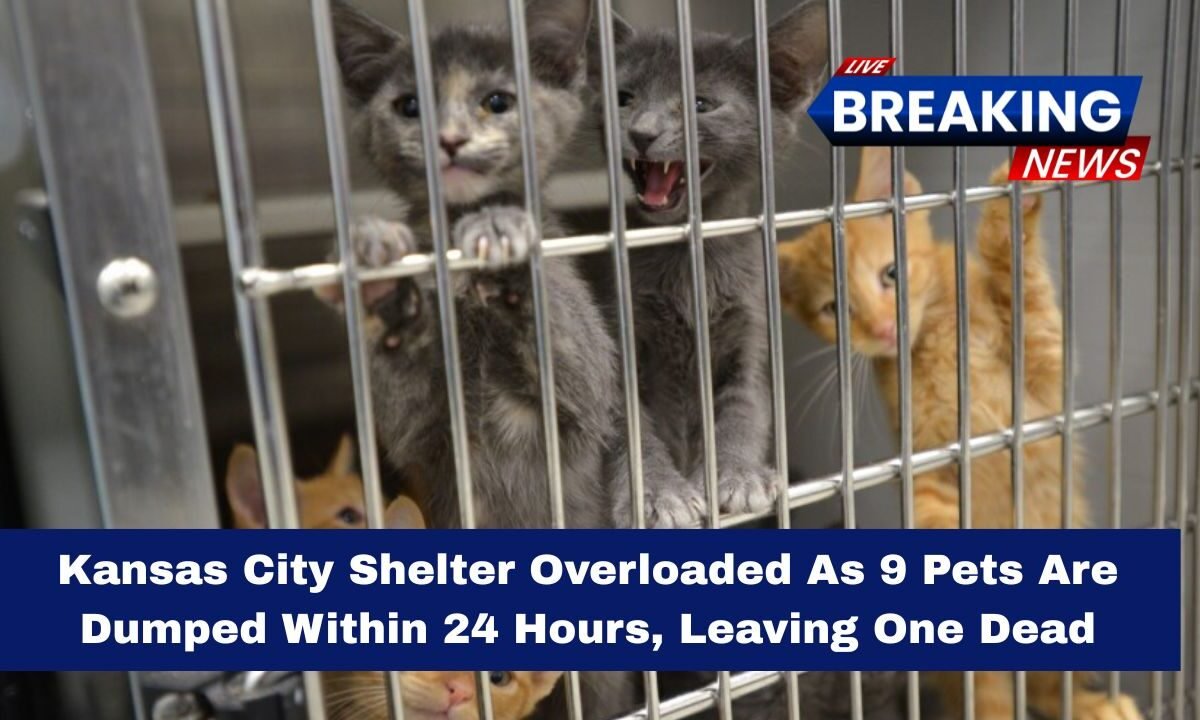Animal welfare workers in Kansas City are sounding the alarm after nine pets were abandoned within just 24 hours, overwhelming an already stretched shelter and leaving one animal dead.
The sudden influx has created a serious crisis, exposing the growing issue of irresponsible pet abandonment and the heavy strain it places on local rescue facilities.
A Disturbing 24-Hour Dumping Surge
Shelter staff reported that eight animals were found trapped inside containers, while a small kitten was spotted fleeing into nearby trees before it could be secured. Among the abandoned animals was a pet discovered inside a plastic trash bag, which tragically died before staff could save it.
Workers described the scene as heartbreaking and emotionally draining. Many of the animals appeared frightened, dehydrated, and in urgent need of care.
The shelter, which was already operating at or near capacity, had no warning about the sudden surge.
The animal that died has been identified by the shelter as “Diva,” a small pet who suffocated inside the sealed bag. Staff members said the incident was one of the most distressing cases they have seen this year.
Shelter Resources Stretched to the Limit
The unexpected arrival of nine animals in a single day pushed the shelter’s resources far beyond their limits. Staff had to delay or deny intake appointments for other pet owners who were planning to surrender animals responsibly.
Along with emotional stress, the shelter now faces increased financial pressure. Each unexpected intake requires:
- Immediate medical evaluation
- Vaccinations
- Food and water
- Temporary housing
- Behavioral assessment
These costs add up quickly—especially when multiple animals arrive without warning.
To address the crisis, the shelter launched an emergency donation push to help cover food, medical supplies, and ongoing care.
Details of the Incident
Below is a clear breakdown of what occurred during the 24-hour period:
| Key Detail | Description |
|---|---|
| Total pets dumped | 9 animals found in 24 hours |
| Animals inside containers | 8 pets trapped in plastic crates or boxes |
| Kitten fleeing scene | 1 small kitten ran into the trees before capture |
| Animal death | 1 pet (named Diva) found inside a trash bag, deceased |
| Impact on shelter operations | Intake appointments delayed or denied |
| Staff response | Emergency medical care, housing, and fundraising efforts |
Growing Problems for Shelters Nationwide
The Kansas City incident highlights a larger trend affecting animal shelters across the country. Many organizations are reporting:
- Rising rates of pet abandonment
- Increased owner surrenders due to housing or financial issues
- Overcrowding linked to limited adoption numbers
- Higher medical costs for neglected or injured animals
When shelters reach capacity, unexpected dumpings become not only a welfare crisis for the animals but a severe operational burden for staff and volunteers.
Why Dumping Pets Is Dangerous
Abandoning pets—especially in bags, boxes, or sealed containers—can be deadly. Animals may face:
- Suffocation
- Heat exhaustion
- Exposure to cold
- Dehydration
- Injury or predation
Beyond physical risks, dumping causes psychological trauma and can delay necessary medical treatment.
Shelters urge pet owners facing difficulties to contact them first. Staff can often arrange safe surrender appointments, connect owners with support programs, or help find alternative solutions.
Community Support Needed Now
The shelter is asking the community to step forward through:
- Donations
- Temporary fostering
- Pet adoptions
- Volunteer support
Every action helps reduce overcrowding and ensures animals receive proper care.
Residents are also encouraged to report suspected abandonment cases immediately, helping protect vulnerable pets from further harm.
The heartbreaking situation in Kansas City—where nine pets were dumped in just 24 hours and one died as a result—is a stark reminder of the responsibilities that come with pet ownership. Shelters are doing everything they can, but they cannot fight this battle alone.
Community compassion, responsible surrender practices, and increased awareness are essential to preventing tragedies like this in the future.




